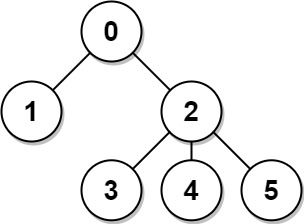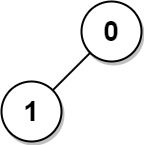| comments | difficulty | edit_url | tags | ||||
|---|---|---|---|---|---|---|---|
true |
Hard |
|
There is an undirected connected tree with n nodes labeled from 0 to n - 1 and n - 1 edges.
You are given the integer n and the array edges where edges[i] = [ai, bi] indicates that there is an edge between nodes ai and bi in the tree.
Return an array answer of length n where answer[i] is the sum of the distances between the ith node in the tree and all other nodes.
Example 1:
Input: n = 6, edges = [[0,1],[0,2],[2,3],[2,4],[2,5]] Output: [8,12,6,10,10,10] Explanation: The tree is shown above. We can see that dist(0,1) + dist(0,2) + dist(0,3) + dist(0,4) + dist(0,5) equals 1 + 1 + 2 + 2 + 2 = 8. Hence, answer[0] = 8, and so on.
Example 2:
Input: n = 1, edges = [] Output: [0]
Example 3:
Input: n = 2, edges = [[1,0]] Output: [1,1]
Constraints:
1 <= n <= 3 * 104edges.length == n - 1edges[i].length == 20 <= ai, bi < nai != bi- The given input represents a valid tree.
class Solution:
def sumOfDistancesInTree(self, n: int, edges: List[List[int]]) -> List[int]:
def dfs1(i: int, fa: int, d: int):
ans[0] += d
size[i] = 1
for j in g[i]:
if j != fa:
dfs1(j, i, d + 1)
size[i] += size[j]
def dfs2(i: int, fa: int, t: int):
ans[i] = t
for j in g[i]:
if j != fa:
dfs2(j, i, t - size[j] + n - size[j])
g = defaultdict(list)
for a, b in edges:
g[a].append(b)
g[b].append(a)
ans = [0] * n
size = [0] * n
dfs1(0, -1, 0)
dfs2(0, -1, ans[0])
return ansclass Solution {
private int n;
private int[] ans;
private int[] size;
private List<Integer>[] g;
public int[] sumOfDistancesInTree(int n, int[][] edges) {
this.n = n;
g = new List[n];
ans = new int[n];
size = new int[n];
Arrays.setAll(g, k -> new ArrayList<>());
for (var e : edges) {
int a = e[0], b = e[1];
g[a].add(b);
g[b].add(a);
}
dfs1(0, -1, 0);
dfs2(0, -1, ans[0]);
return ans;
}
private void dfs1(int i, int fa, int d) {
ans[0] += d;
size[i] = 1;
for (int j : g[i]) {
if (j != fa) {
dfs1(j, i, d + 1);
size[i] += size[j];
}
}
}
private void dfs2(int i, int fa, int t) {
ans[i] = t;
for (int j : g[i]) {
if (j != fa) {
dfs2(j, i, t - size[j] + n - size[j]);
}
}
}
}class Solution {
public:
vector<int> sumOfDistancesInTree(int n, vector<vector<int>>& edges) {
vector<vector<int>> g(n);
for (auto& e : edges) {
int a = e[0], b = e[1];
g[a].push_back(b);
g[b].push_back(a);
}
vector<int> ans(n);
vector<int> size(n);
function<void(int, int, int)> dfs1 = [&](int i, int fa, int d) {
ans[0] += d;
size[i] = 1;
for (int& j : g[i]) {
if (j != fa) {
dfs1(j, i, d + 1);
size[i] += size[j];
}
}
};
function<void(int, int, int)> dfs2 = [&](int i, int fa, int t) {
ans[i] = t;
for (int& j : g[i]) {
if (j != fa) {
dfs2(j, i, t - size[j] + n - size[j]);
}
}
};
dfs1(0, -1, 0);
dfs2(0, -1, ans[0]);
return ans;
}
};func sumOfDistancesInTree(n int, edges [][]int) []int {
g := make([][]int, n)
for _, e := range edges {
a, b := e[0], e[1]
g[a] = append(g[a], b)
g[b] = append(g[b], a)
}
ans := make([]int, n)
size := make([]int, n)
var dfs1 func(i, fa, d int)
dfs1 = func(i, fa, d int) {
ans[0] += d
size[i] = 1
for _, j := range g[i] {
if j != fa {
dfs1(j, i, d+1)
size[i] += size[j]
}
}
}
var dfs2 func(i, fa, t int)
dfs2 = func(i, fa, t int) {
ans[i] = t
for _, j := range g[i] {
if j != fa {
dfs2(j, i, t-size[j]+n-size[j])
}
}
}
dfs1(0, -1, 0)
dfs2(0, -1, ans[0])
return ans
}function sumOfDistancesInTree(n: number, edges: number[][]): number[] {
const g: number[][] = Array.from({ length: n }, () => []);
for (const [a, b] of edges) {
g[a].push(b);
g[b].push(a);
}
const ans: number[] = new Array(n).fill(0);
const size: number[] = new Array(n).fill(0);
const dfs1 = (i: number, fa: number, d: number) => {
ans[0] += d;
size[i] = 1;
for (const j of g[i]) {
if (j !== fa) {
dfs1(j, i, d + 1);
size[i] += size[j];
}
}
};
const dfs2 = (i: number, fa: number, t: number) => {
ans[i] = t;
for (const j of g[i]) {
if (j !== fa) {
dfs2(j, i, t - size[j] + n - size[j]);
}
}
};
dfs1(0, -1, 0);
dfs2(0, -1, ans[0]);
return ans;
}

